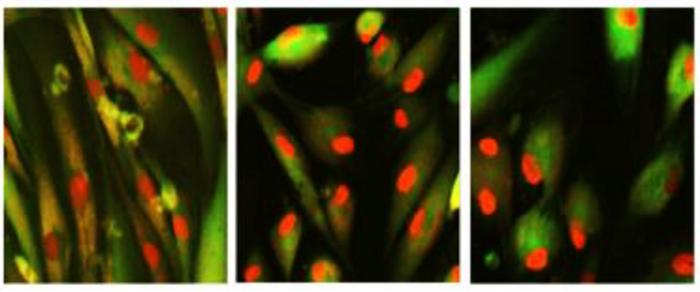On July 12, 2023, a new research paper was published in Aging, titled, “Chemically induced reprogramming to reverse cellular aging.”

Credit: 2023 Yang et al.
On July 12, 2023, a new research paper was published in Aging, titled, “Chemically induced reprogramming to reverse cellular aging.”
BUFFALO, NY- July 12, 2023 – In a groundbreaking study, researchers have unlocked a new frontier in the fight against aging and age-related diseases. The study, conducted by a team of scientists at Harvard Medical School, has published the first chemical approach to reprogram cells to a younger state. Previously, this was only achievable using a powerful gene therapy.
On July 12, 2023, researchers Jae-Hyun Yang, Christopher A. Petty, Thomas Dixon-McDougall, Maria Vina Lopez, Alexander Tyshkovskiy, Sun Maybury-Lewis, Xiao Tian, Nabilah Ibrahim, Zhili Chen, Patrick T. Griffin, Matthew Arnold, Jien Li, Oswaldo A. Martinez, Alexander Behn, Ryan Rogers-Hammond, Suzanne Angeli, Vadim N. Gladyshev, and David A. Sinclair from Harvard Medical School, University of Maine and Massachusetts Institute of Technology (MIT) published a new research paper in Aging, titled, “Chemically induced reprogramming to reverse cellular aging.”
The team’s findings build upon the discovery that the expression of specific genes, called Yamanaka factors, could convert adult cells into induced pluripotent stem cells (iPSCs). This Nobel Prize-winning discovery raised the question of whether it might be possible to reverse cellular aging without causing cells to become too young and turn cancerous.
In this new study, the researchers screened for molecules that could, in combination, reverse cellular aging and rejuvenate human cells. They developed high-throughput cell-based assays to distinguish young cells from old and senescent cells, including transcription-based aging clocks and a real-time nucleocytoplasmic protein compartmentalization (NCC) assay. In an exciting discovery, the team has identified six chemical cocktails that restore NCC and genome-wide transcript profiles to youthful states and reverse transcriptomic age in less than a week.
The Harvard researchers previously demonstrated that it is indeed possible to reverse cellular aging without uncontrolled cell growth by virally-introducing specific Yamanaka genes into cells. Studies on the optic nerve, brain tissue, kidney, and muscle have shown promising results, with improved vision and extended lifespan observed in mice and, recently, a report of improved vision in monkeys.
The implications of this new discovery are far-reaching, opening avenues for regenerative medicine and, potentially, whole-body rejuvenation. By developing a chemical alternative to age reversal via gene therapy, this research could revolutionize the treatment of aging, injuries and age-related diseases and offers the potential for lower costs and shorter timelines in development. On the heels of positive results in reversing blindness in monkeys in April 2023, preparations for human clinical trials of the lab’s age reversal gene therapy are in progress.
“Until recently, the best we could do was slow aging. New discoveries suggest we can now reverse it,” said David A. Sinclair, A.O., Ph.D., Professor in the Department of Genetics and co-Director of the Paul F. Glenn Center for Biology of Aging Research at Harvard Medical School and lead scientist on the project. “This process has previously required gene therapy, limiting its widespread use.”
The team at Harvard envisions a future where age-related diseases can be effectively treated, injuries can be repaired more efficiently, and the dream of whole-body rejuvenation becomes a reality. “This new discovery offers the potential to reverse aging with a single pill, with applications ranging from improving eyesight to effectively treating numerous age-related diseases,” Sinclair said.
Read the full study: DOI: https://doi.org/10.18632/aging.204896
Corresponding Author: David A. Sinclair
Corresponding Email: [email protected]
Keywords: reprogramming, rejuvenation medicine, information theory of aging, small molecules, epigenetics
Sign up for free Altmetric alerts about this article: https://aging.altmetric.com/details/email_updates?id=10.18632%2Faging.204896
About Aging: Launched in 2009, Aging (listed by MEDLINE/PubMed as “Aging (Albany NY)” and “Aging-US” by Web of Science) publishes papers of general interest and biological significance in all fields of aging research and age-related diseases, including cancer—and now, with a special focus on COVID-19 vulnerability as an age-dependent syndrome. Topics in Aging go beyond traditional gerontology, including, but not limited to, cellular and molecular biology, human age-related diseases, epigenetic reprogramming, pathology in model organisms, signal transduction pathways (e.g., p53, sirtuins, and PI-3K/AKT/mTOR, among others), and approaches to modulating these signaling pathways.
Please visit our website at www.Aging-US.com and connect with us:
- SoundCloud
- YouTube
- LabTube
Click here to subscribe to Aging publication updates.
For media inquiries, please contact [email protected].
Aging Journal Office
6666 E. Quaker Str., Suite 1B
Orchard Park, NY 14127
Phone: 1-800-922-0957, option 1
###
Journal
Aging-US
DOI
10.18632/aging.204896
Method of Research
Experimental study
Subject of Research
Animals
Article Title
Chemically induced reprogramming to reverse cellular aging
Article Publication Date
12-Jul-2023




